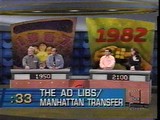My Generation
From RulesWiki
| MY GENERATION | |
| The My Generation opening title. | |
|---|---|
| Airdates: | VH1 March 1998 - September 1998 |
| Host: | Craig Shoemaker |
| Announcer: | Lindsay Stoddart |
| Producer: | Gary Marks |
Contents |
[edit]
Gameplay
[edit]
Front Game
Two teams of two, representing two years of music history spaced ten to twenty years apart, compete. In the first round, called the "Cassette Round", five categories are presented to the teams, which questions in each category stemming from both generations. The winner of a coin toss would select the first category and its generation, and the host would read the "A-side" toss-up question to all four players. The player who buzzes in with the correct answer scores 50 points for his team, and his partner is given the choice to answer the "B-side" question for 100 points. (If a player answered either question wrong, the points were deducted and the other team got a chance to answer.) Answering both questions correctly made them eligible for a 200-point bonus question, which did not deduct points if answered wrong but still gave the other team a chance at the rebound. If a team selected a category from the opponents' generation and got the A-side question right, they won a bonus prize.
[edit]
Bonus Round - "The Time Warp"
The winning team now had 60 seconds to "bridge the generation gap" by naming seven bands that were popular between their representative year and that of their opponents. Starting with their year and moving either backwards or forwards in time, one team member would try to get his partner to guess the band or performer with the use of a two-word clue, with gesturing permitted but not repetitions of a word. The team was allowed three passes; using more than two words or saying part of the act's name also counted as a pass. If the team could convey seven acts in under 60 seconds, they won a trip to Las Vegas and a prize package; otherwise, they merely won the smaller prizes.
[edit]
Notes
- The show itself was taped on a "virtual set". Namely, the entire stage was green, and all graphics and animation were superimposed live as the game was taped.





